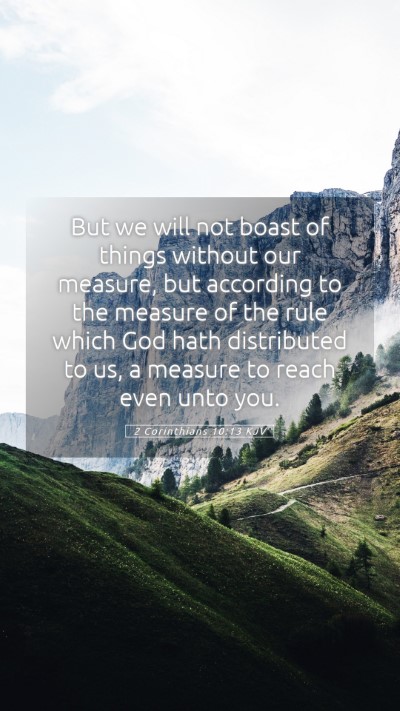Understanding 2 Corinthians 10:13
The verse states: "But we will not boast of things without our measure, but according to the measure of the rule which God hath distributed to us, a measure to reach even unto you." This passage, penned by the Apostle Paul, emphasizes several core themes that are pivotal for understanding its context and significance.
Overview of the Verse
In this verse, Paul delineates the boundaries of his ministry and the authority given to him by God. He expresses a reluctance to engage in self-aggrandizement, recognizing that his accomplishments are not solely of his doing but rather are a manifestation of God’s work through him.
Bible Verse Meanings and Interpretations
-
Humility in Ministry: Paul’s reference to not boasting over things beyond his measure speaks to the virtue of humility. Matthew Henry notes that ministers should not overreach but remain within the specific calling that God has assigned to them.
-
God’s Distribution: The phrase "according to the measure of the rule which God hath distributed to us" highlights the sovereignty of God in assigning roles within the church. Adam Clarke emphasizes that God gives grace and ability to fulfill the tasks he commands.
-
Corporate Spirituality: Paul’s measure extends to the Corinthians, indicating a collective part of the body of Christ. Albert Barnes observes that Paul emphasizes not only his mission but also the connection and responsibility towards the believers he serves.
-
A Caution Against Pride: This passage serves as a warning against prideful boasting, which can lead to a false sense of superiority among believers. The commentary suggests this humility acts as a foundation for effective service and unity in the church.
In-Depth Bible Verse Analysis
To fully grasp the implications of Paul’s message, it is critical to consider the historical and cultural context within which he wrote. The Corinthian church was facing numerous challenges, including divisions and false teachings. Paul’s assertion about maintaining proper bounds in ministry serves as a corrective to these issues.
Historical Context
Written during Paul’s ministry in the first century A.D., 2 Corinthians addresses the church in a bustling, multicultural city. This background provides insight into why Paul takes such care in clarifying the limits of his authority and the nature of his mission. By emphasizing reliance on God’s measurements, he confronts the errant perceptions of both himself and others concerning apostolic authority.
Application of the Verse to Daily Life
The teachings gleaned from 2 Corinthians 10:13 have practical implications for contemporary believers:
-
Accountability: Every believer is called to walk in their calling with accountability, ensuring that they do not exceed what God has appointed for them, fostering a climate of collaboration rather than competition.
-
Community Focus: Understanding that one's ministry impacts others encourages a communal approach to faith practice, emphasizing the interconnectedness within the body of Christ.
-
Healthy Self-Image: The balance between recognizing God’s work in oneself and avoiding pride addresses issues around self-worth and identity in Christ, leading to a more robust and biblically grounded self-perception.
Cross References
- Romans 12:3: A related discourse on humility and sober judgment.
- 1 Corinthians 3:5-7: Paul discusses the roles of various ministers within the church framework.
- 2 Corinthians 12:9: An extension of Paul’s understanding of grace in weakness.
Conclusion
The deeper understanding of 2 Corinthians 10:13 provides valuable insights for Bible study groups, online Bible study, and personal reflection. By studying this verse, one can derive critical lessons about humility, accountability, and the importance of remaining within God’s appointed roles. This understanding paves the way for applying Scripture in daily life, ensuring believers draw closer to God’s intended purpose for them.


